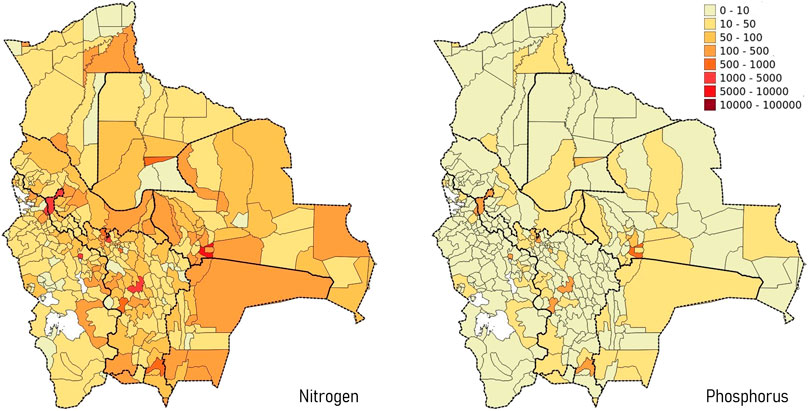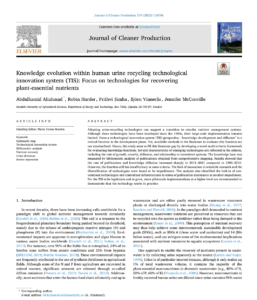We have exciting news! The Swedish Research Council FORMAS has granted funding for our project called RECAPTURE: Circular Economy Certification and Production of Urine Fertiliser. RECAPTURE is a collaboration between #SLU, #Sanitation360, #Ecoloop and #RISE, and has 3 short-term goals: 1) optimization of fertiliser formation to work with conventional farming equipment; 2) review the applicability of SPCR178 certification for urine and other emerging products; 3) conceptual idea of a tag-on to fertiliser certifications to include environmental aspects.
Jade Borel to intern with the SLU urine drying team
 My name is Jade Borel and I come from France, Grenoble. I am in the third year of environmental engineering school in Rennes. At SLU, I am part of the urine drying research team. I will work with urease enzyme and analyse how urine salts affect enzymatic activity. My intership started early November and I will be staying until the end of January.
My name is Jade Borel and I come from France, Grenoble. I am in the third year of environmental engineering school in Rennes. At SLU, I am part of the urine drying research team. I will work with urease enzyme and analyse how urine salts affect enzymatic activity. My intership started early November and I will be staying until the end of January.
Liudmila Nazarova working with fate of biodegradable polymers in wastewater
My name is Liudmila Nazarova and I am coming from Russia, Saint-Petersburg. I am a fourth-year Environmental Engineering student at Tampere University of Applied Science (Finland). I am part of the Kretsloppsteknik research team at SLU. I am working on the fate and chemical degradation of biodegradable polymers in wastewater at different process conditions. I will be working in the group from September until the end of November.
We find there is potential to convert food industry waste to animal protein in Tanzania
In our latest publication Food industry waste – An opportunity for black soldier fly larvae protein production in Tanzania recently published in Science of the Total Environment, we have investigated the potential of food industry waste as substrate for rearing of black soldier fly larvae (BSFL). We first conducted a survey, in which we assessed occurrence of wastes in different food industries in three large cities in Tanzania: Dar-es Salaam, Mwanza and Dodoma. We asked the companies a number of questions related to their current waste management system. Once we had an idea which waste streams that was available, we performed a multi-criteria assessment of the most suitable waste streams for BSFL rearing, taking into both availability (available quantities and potential competing use etcetera) and the physical characteristics of the waste. If you are curious to know which food industries there are, what waste they generate, what they currently do with their waste and which of these waste streams that could be used for BSFL rearing, read our article.
New Vetenskapsrådet funding for urine drying in Bolivia

We’re happy to share that the #Bolivia project on #urinedrying that we started in 2018 will continue for another four years through new funding from Vetenskapsrådet / Swedish Research Council. In the project, we will be developing novel chemical pellets that can capture all the nutrients in urine, while removing organics pollutants and malodour-causing substances. The pellets will be evaluated against real-life aspects and natural contaminants before they are field-tested in urban settings in Bolivia. Project partners in Boliva include Luis Fernando Perez Mercado and Mercedes Iriarte from Centro de Aguas y Saneamiento Ambiental at the University of San Simon in Cochabamba.
Link: https://www.slu.se/en/ew-news/2022/11/fundings-from-vr/
Knowledge evolution within human urine recycling technological innovation system (TIS): Focus on technologies for recovering plant-essential nutrients
”Knowledge development and diffusion” is a key function in developing technological innovation systems (TIS), especially early in the formative phase. If you are interested in knowing whether the current knowledge base on nutrient recovery technologies is sufficient to further develop urine recycling TISs, then this paper is for you:
https://lnkd.in/dRbqn-8g
We ( Robin Harder, Prithvi Simha, Bjorn Vinneras, Jennifer McConville and myself) conducted a bibliometric analysis and comprehensive mapping of existing urine recycling knowledge and used a novel multi-criteria framework to evaluate whether the development of such a TIS is feasible. Results showed that the rate of publications and knowledge diffusion increased sharply in 2011–2021 compared to 1990–2010. However, the function still has insufficiency in some criteria. … paper is attached.
Happy reading!

New Horizon Europe Project “P2Green” will pilot urine dehydration technology in Gotland!

A consortium of 32 partner organisations from 12 European countries and Switzerland including SLU and Sanitation360 have justed signed the Grant Agreement for a four-year Horizon Europe Project aiming to “close the gap between fork and farm for circular nutrient flows” short P2GreeN. From our group in Sweden, Jenna Senecal, Prithvi Simha, Jennifer McConville, and Björn Vinnerås will participate in the project. The project will start on the first of December 2022, and is coordinated by agrathaer GmbH and Leibniz Institute of Vegetable and Ornamental Crops (IGZ) e.V.
P2GreeN’s overall objective is to foster a circular material flow system between urban and rural areas thereby restoring the coupling of the water-agri-food system following the 3R principle “Reduce, Reuse, Recover”. To achieve this, P2GreeN will develop new solutions for the circular economy to halt and eliminate nitrogen (N) and phosphorus (P) pollution by connecting blue urban with green rural infrastructure, focussing on circular nutrient flows of nitrogen (N) and phosphorus (P), two important plant nutrients and at the same time water polluters. This objective will be achieved through the implementation and exploration of innovative N and P recovery solutions for the utilization of human sanitary waste from urban settlements and its conversion into safe bio-based fertilizers for agricultural production in three pilot regions.
We’re hiring! Two PhD student positions on development and assessment of next generation sanitation systems that recycle urine
Our group has two new positions for hiring PhD candidates –
PhD position in technology development of next generation sanitation systems. Link: https://www.slu.se/en/about-slu/work-at-slu/jobs-vacancies/?rmpage=job&rmjob=7343&rmlang=UK
SLU has developed a new technology to treat source-separated human urine, where fresh human urine is chemically stabilised and then evaporated to produce water and a solid fertilizer. The technology has been piloted in several locations across Sweden (e.g., at the offices of VA Syd in Malmö). If implemented globally, human urine could substitute about one-quarter of current nitrogen and phosphorus fertilizers worldwide.
The aim of this PhD project will be to continue the technology development, with focus on performing research in support of scaling up the urine dehydrating sanitation system. During this project, lab-scale treatment systems available at SLU will be scaled up into full scale operations for the production of 25 kg of dry fertilisers per day. The project will involve both fundamental research (e.g., evaluating changes to composition and properties of urine during dehydration) and implementation research (e.g., developing reactors for stabilizing urine at the toilet). The PhD project will be part of a larger Horizon Europe Research and Innovation Action collaborative project, “P2Green” (Closing the gap between fork and farm for circular nutrient flows), where three pilot regions will scale-up and implement innovative sanitation technologies in real-life conditions. The Island of Gotland will be one of the pilot regions where SLU will scale up and validate urine dehydration. Contact: Bjorn Vinneras
PhD position in sustainable assessment of new sanitation systems. Link: https://www.slu.se/en/about-slu/work-at-slu/jobs-vacancies/?rmpage=job&rmjob=7342&rmlang=UK
The aim of this project is to investigate the potential for new sanitation innovations to provide sustainable benefits by quantifying trade-offs in terms of environmental impacts, costs and uncertainties. The primary focus will be on developing decision-support tools that allow decision-makers to weight trade-offs and test options for integrating new sanitation systems into existing infrastructures. Methods used will include life cycle assessment, cost-benefit analysis and systems dynamic modeling. The assessment methods will be applied on case studies of emerging technologies for nutrient recovery from urine and wastewater in the context of an EU project. The work will include interaction with stakeholders to co-design of development trajectories for integrating new sanitation systems into the local context. Contact: Jennifer McConville
SLU Youth Institutes intervju med Viktoria kan nu ses
Intervjuen (på svenska!) som SLU Youth Institute gjorde med Viktoria om fluglarvskompostering är nu ute. I videon nedan kan vi se intervjuen 10 min.
SLU Youth Institute’s interview with Viktoria can now be seen
The interview Viktoria had (in Swedish!) with SLU Youth Institute about our work on fly larvae composting is now out. In the video below you can see the interview 10 min in.



